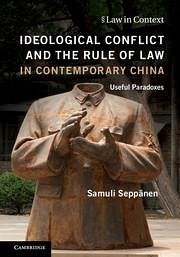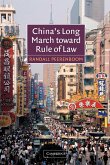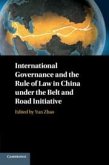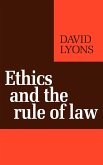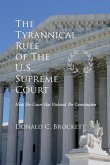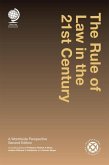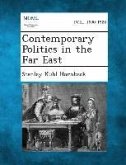- Broschiertes Buch
- Merkliste
- Auf die Merkliste
- Bewerten Bewerten
- Teilen
- Produkt teilen
- Produkterinnerung
- Produkterinnerung
This book studies ideological divisions within Chinese legal academia and their relationship to arguments about the rule of law.
Andere Kunden interessierten sich auch für
![China's Long March Toward Rule of Law China's Long March Toward Rule of Law]() Randall P. PeerenboomChina's Long March Toward Rule of Law77,99 €
Randall P. PeerenboomChina's Long March Toward Rule of Law77,99 €![International Governance and the Rule of Law in China under the Belt and Road Initiative International Governance and the Rule of Law in China under the Belt and Road Initiative]() International Governance and the Rule of Law in China under the Belt and Road Initiative45,99 €
International Governance and the Rule of Law in China under the Belt and Road Initiative45,99 €![Ethics and the Rule of Law Ethics and the Rule of Law]() David LyonsEthics and the Rule of Law63,99 €
David LyonsEthics and the Rule of Law63,99 €![A Selection of Cases on the Conflict of Laws A Selection of Cases on the Conflict of Laws]() Joseph Henry BealeA Selection of Cases on the Conflict of Laws35,99 €
Joseph Henry BealeA Selection of Cases on the Conflict of Laws35,99 €![The Tyrannical Rule of The U.S. Supreme Court The Tyrannical Rule of The U.S. Supreme Court]() Donald C BrockettThe Tyrannical Rule of The U.S. Supreme Court17,99 €
Donald C BrockettThe Tyrannical Rule of The U.S. Supreme Court17,99 €![The Rule of Law in the 21st Century The Rule of Law in the 21st Century]() The Rule of Law in the 21st Century162,99 €
The Rule of Law in the 21st Century162,99 €![Contemporary Politics in the Far East Contemporary Politics in the Far East]() Stanley Kuhl HornbeckContemporary Politics in the Far East42,99 €
Stanley Kuhl HornbeckContemporary Politics in the Far East42,99 €-
-
-
This book studies ideological divisions within Chinese legal academia and their relationship to arguments about the rule of law.
Hinweis: Dieser Artikel kann nur an eine deutsche Lieferadresse ausgeliefert werden.
Hinweis: Dieser Artikel kann nur an eine deutsche Lieferadresse ausgeliefert werden.
Produktdetails
- Produktdetails
- Verlag: Cambridge University Press
- Seitenzahl: 230
- Erscheinungstermin: 17. Oktober 2016
- Englisch
- Abmessung: 246mm x 172mm x 13mm
- Gewicht: 410g
- ISBN-13: 9781316506189
- ISBN-10: 1316506185
- Artikelnr.: 45160402
- Herstellerkennzeichnung
- Libri GmbH
- Europaallee 1
- 36244 Bad Hersfeld
- gpsr@libri.de
- Verlag: Cambridge University Press
- Seitenzahl: 230
- Erscheinungstermin: 17. Oktober 2016
- Englisch
- Abmessung: 246mm x 172mm x 13mm
- Gewicht: 410g
- ISBN-13: 9781316506189
- ISBN-10: 1316506185
- Artikelnr.: 45160402
- Herstellerkennzeichnung
- Libri GmbH
- Europaallee 1
- 36244 Bad Hersfeld
- gpsr@libri.de
Samuli Seppänen is an assistant professor at the Faculty of Law of The Chinese University of Hong Kong. He holds an S. J. D. degree from Harvard Law School and a law degree from Helsinki University, Finland.
Foreword William P. Alford
Preface and acknowledgments
1. Introduction: 1.1 A change of perspective
1.2 A return to ideology
1.3 Limitations, academic positioning and apologies
1.4 Structure of the book
2. Setting the stage: 2.1. Three generations of Chinese legal scholars
2.2 Historically significant scholarship
2.3 Conservative socialist reforms
2.4 The mainstream state of mind
2.5 Liberal sensibilities
2.6 The avant-garde point of view
2.7 New orthodoxies and heterodoxies
2.8 Conclusion: resisting and affirming the ideological positions
3. Ideological cynicism meets theoretical skepticism: 3.1 Some realism about ideological realism
3.2 The life and thought of Luo Gan
3.3 Luo Gan's speeches through the kaleidoscope of social theory
3.4 A theoretical smorgasbord
3.5. Conclusion: knowing how not to know
4. Useful paradoxes: the conservative socialist ideological position: 4.1 Introduction
4.2 Between the romanticism of illegality and the romanticism of legality
4.3 Useful paradoxes
4.4 Neoconservative reconfigurations
4.5 Conclusion: paradoxes as entry points for local knowledge
5. Thick mainstream, thin liberalism and vice versa: 5.1 Introduction
5.2 All things considered
5.3 Wang Liming and mainstream strategies
5.4 Prescriptions of paternalism and autonomy
5.5 Li Buyun and the ever-thickening rule of law conception
5.6 Liberalism for an authoritarian state
5.7 Conclusion: merging the narratives
6. Avant-garde renewal and nostalgia: 6.1 Introduction
6.2 Critical avant-garde scholarship
6.3 New Confucian hybrids
6.4 Communitarian rule of law
6.5 The paradoxes of ideological renewal
6.6 Jiang Shigong and the irrationalist turn
6.7 Conclusion: a cycle of hope and disillusionment
7. Conclusions
7.1 'But nothing falls'?
7.2 Argumentative strategies
7.3 Leaps of faith
7.4 Ideological positions at play: explicating the rural land rights debate
7.5 Orientalist exotica
Textbook answers to the questions in chapters 1-6
Bibliography
Index.
Preface and acknowledgments
1. Introduction: 1.1 A change of perspective
1.2 A return to ideology
1.3 Limitations, academic positioning and apologies
1.4 Structure of the book
2. Setting the stage: 2.1. Three generations of Chinese legal scholars
2.2 Historically significant scholarship
2.3 Conservative socialist reforms
2.4 The mainstream state of mind
2.5 Liberal sensibilities
2.6 The avant-garde point of view
2.7 New orthodoxies and heterodoxies
2.8 Conclusion: resisting and affirming the ideological positions
3. Ideological cynicism meets theoretical skepticism: 3.1 Some realism about ideological realism
3.2 The life and thought of Luo Gan
3.3 Luo Gan's speeches through the kaleidoscope of social theory
3.4 A theoretical smorgasbord
3.5. Conclusion: knowing how not to know
4. Useful paradoxes: the conservative socialist ideological position: 4.1 Introduction
4.2 Between the romanticism of illegality and the romanticism of legality
4.3 Useful paradoxes
4.4 Neoconservative reconfigurations
4.5 Conclusion: paradoxes as entry points for local knowledge
5. Thick mainstream, thin liberalism and vice versa: 5.1 Introduction
5.2 All things considered
5.3 Wang Liming and mainstream strategies
5.4 Prescriptions of paternalism and autonomy
5.5 Li Buyun and the ever-thickening rule of law conception
5.6 Liberalism for an authoritarian state
5.7 Conclusion: merging the narratives
6. Avant-garde renewal and nostalgia: 6.1 Introduction
6.2 Critical avant-garde scholarship
6.3 New Confucian hybrids
6.4 Communitarian rule of law
6.5 The paradoxes of ideological renewal
6.6 Jiang Shigong and the irrationalist turn
6.7 Conclusion: a cycle of hope and disillusionment
7. Conclusions
7.1 'But nothing falls'?
7.2 Argumentative strategies
7.3 Leaps of faith
7.4 Ideological positions at play: explicating the rural land rights debate
7.5 Orientalist exotica
Textbook answers to the questions in chapters 1-6
Bibliography
Index.
Foreword William P. Alford
Preface and acknowledgments
1. Introduction: 1.1 A change of perspective
1.2 A return to ideology
1.3 Limitations, academic positioning and apologies
1.4 Structure of the book
2. Setting the stage: 2.1. Three generations of Chinese legal scholars
2.2 Historically significant scholarship
2.3 Conservative socialist reforms
2.4 The mainstream state of mind
2.5 Liberal sensibilities
2.6 The avant-garde point of view
2.7 New orthodoxies and heterodoxies
2.8 Conclusion: resisting and affirming the ideological positions
3. Ideological cynicism meets theoretical skepticism: 3.1 Some realism about ideological realism
3.2 The life and thought of Luo Gan
3.3 Luo Gan's speeches through the kaleidoscope of social theory
3.4 A theoretical smorgasbord
3.5. Conclusion: knowing how not to know
4. Useful paradoxes: the conservative socialist ideological position: 4.1 Introduction
4.2 Between the romanticism of illegality and the romanticism of legality
4.3 Useful paradoxes
4.4 Neoconservative reconfigurations
4.5 Conclusion: paradoxes as entry points for local knowledge
5. Thick mainstream, thin liberalism and vice versa: 5.1 Introduction
5.2 All things considered
5.3 Wang Liming and mainstream strategies
5.4 Prescriptions of paternalism and autonomy
5.5 Li Buyun and the ever-thickening rule of law conception
5.6 Liberalism for an authoritarian state
5.7 Conclusion: merging the narratives
6. Avant-garde renewal and nostalgia: 6.1 Introduction
6.2 Critical avant-garde scholarship
6.3 New Confucian hybrids
6.4 Communitarian rule of law
6.5 The paradoxes of ideological renewal
6.6 Jiang Shigong and the irrationalist turn
6.7 Conclusion: a cycle of hope and disillusionment
7. Conclusions
7.1 'But nothing falls'?
7.2 Argumentative strategies
7.3 Leaps of faith
7.4 Ideological positions at play: explicating the rural land rights debate
7.5 Orientalist exotica
Textbook answers to the questions in chapters 1-6
Bibliography
Index.
Preface and acknowledgments
1. Introduction: 1.1 A change of perspective
1.2 A return to ideology
1.3 Limitations, academic positioning and apologies
1.4 Structure of the book
2. Setting the stage: 2.1. Three generations of Chinese legal scholars
2.2 Historically significant scholarship
2.3 Conservative socialist reforms
2.4 The mainstream state of mind
2.5 Liberal sensibilities
2.6 The avant-garde point of view
2.7 New orthodoxies and heterodoxies
2.8 Conclusion: resisting and affirming the ideological positions
3. Ideological cynicism meets theoretical skepticism: 3.1 Some realism about ideological realism
3.2 The life and thought of Luo Gan
3.3 Luo Gan's speeches through the kaleidoscope of social theory
3.4 A theoretical smorgasbord
3.5. Conclusion: knowing how not to know
4. Useful paradoxes: the conservative socialist ideological position: 4.1 Introduction
4.2 Between the romanticism of illegality and the romanticism of legality
4.3 Useful paradoxes
4.4 Neoconservative reconfigurations
4.5 Conclusion: paradoxes as entry points for local knowledge
5. Thick mainstream, thin liberalism and vice versa: 5.1 Introduction
5.2 All things considered
5.3 Wang Liming and mainstream strategies
5.4 Prescriptions of paternalism and autonomy
5.5 Li Buyun and the ever-thickening rule of law conception
5.6 Liberalism for an authoritarian state
5.7 Conclusion: merging the narratives
6. Avant-garde renewal and nostalgia: 6.1 Introduction
6.2 Critical avant-garde scholarship
6.3 New Confucian hybrids
6.4 Communitarian rule of law
6.5 The paradoxes of ideological renewal
6.6 Jiang Shigong and the irrationalist turn
6.7 Conclusion: a cycle of hope and disillusionment
7. Conclusions
7.1 'But nothing falls'?
7.2 Argumentative strategies
7.3 Leaps of faith
7.4 Ideological positions at play: explicating the rural land rights debate
7.5 Orientalist exotica
Textbook answers to the questions in chapters 1-6
Bibliography
Index.

